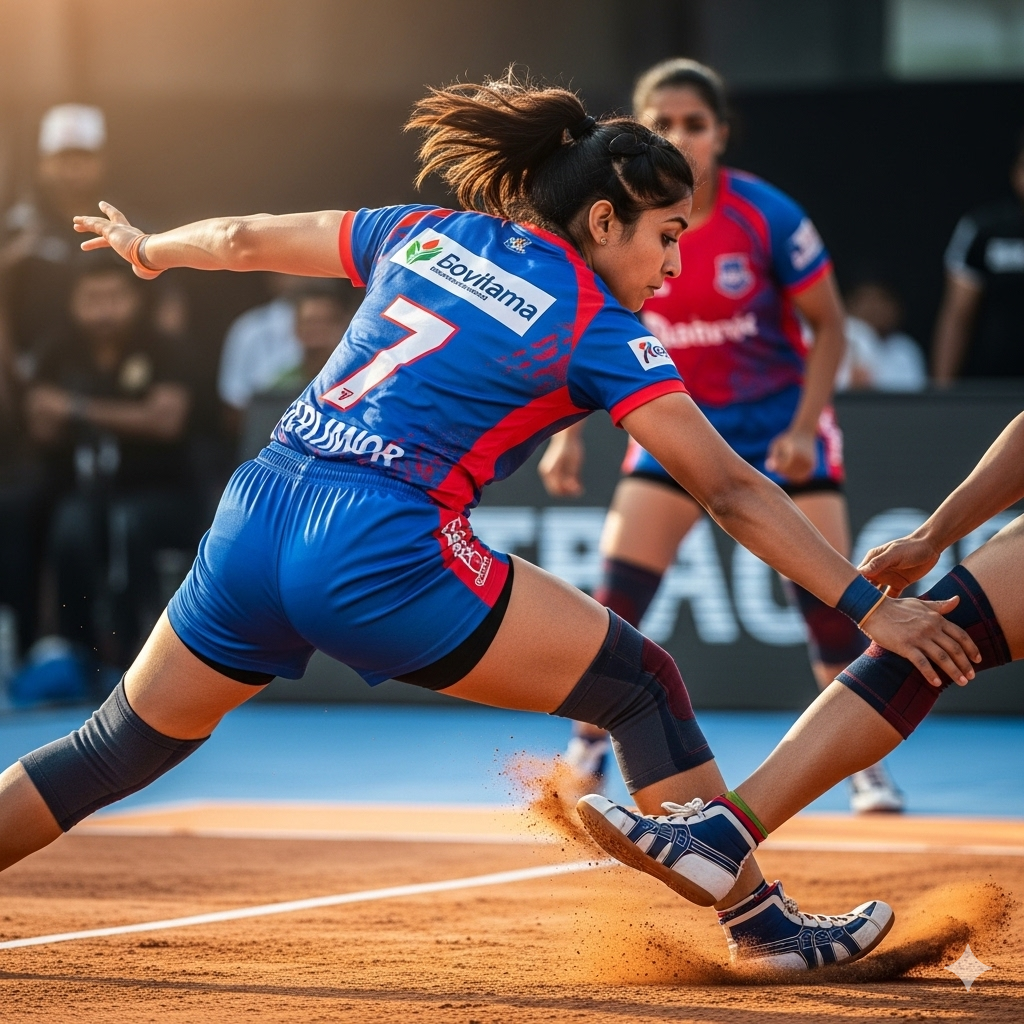
The cheers of a packed indoor stadium once belonged to Arvind Kulkarni, captain of India’s national men’s kabaddi team. He had led India to the World Championship five years ago, but a single controversial match changed everything.
During a tense final against Pakistan, a referee accused him of an intentional foul. India lost by a whisker. News channels repeated the replay, calling it “the shameful push.” Arvind pleaded innocence, but the federation dropped him. Overnight he went from hero to villain.
For years he lived in Pune, teaching kabaddi basics to schoolchildren, quietly carrying the weight of humiliation.
One summer morning, a letter arrived.
“Women’s National Kabaddi Trials – Coach Required.”
The women’s team had never won any international medal and barely qualified for tournaments. Most top coaches refused the job.
Arvind hesitated. Training a neglected team with no facilities looked thankless, but somewhere inside he sensed a chance—not just for the players, but to prove to himself that the spirit of the game still mattered. He sent his acceptance.
The trials were held in Nagpur, at a dusty sports hostel. Fifteen young women stood before him, all with different stories and states, Meera Pawar – fiery raider from Kolhapur, quick as lightning, Fatima Sheikh – strong defender from Hyderabad, juggling family duties, Nandini Yadav – tall from Varanasi, more comfortable wrestling bulls than practicing drills., Leela and Rupa, sisters from Kerala, who played barefoot on village grounds., Sonam Rawat – a shy but strategic mind from Dehradun.
They eyed Arvind with doubt. “Why should we listen to a disgraced player?” Meera whispered to the others.
Practice began at dawn. Arvind pushed them hard: sprints in the red mud, endless ankle-strength exercises, and sharp tactical sessions. The women grumbled.
Conflicts erupted: Meera accused Fatima of being selfish during raids. The Kerala sisters refused Hindi instructions. Sonam silently cried from homesickness.
Arvind remained calm. One evening he gathered them near the field’s lone neem tree.
“You think you play for your districts,” he said. “But on that mat, you are one team—India’s Tigers. Only together can you win.”
He introduced fun scrimmages mixing languages and states, forcing them to communicate beyond words. Slowly, friendships formed. They began calling themselves “The Tigresses".
Money was scarce. The federation delayed travel funds. Local boys mocked their practice. But the Tigresses held on, sharing meals of poha and lemon water, stitching their own jerseys.
Arvind sold his old bike to buy better shoes for them.
“You sold your bike for us?” Meera asked, surprised.
“You are my team now,” he replied.
At the National Women’s Kabaddi Championship in Jaipur, they faced seasoned state squads.
Game after game, the Tigresses played with ferocious unity. Fatima’s tackles drew gasps. Meera’s daring raids thrilled the crowd. When they lifted the national trophy, newspapers finally took notice: “Underdog Women’s Team Roars.”
The victory qualified them for the Asian Women’s Kabaddi Cup in Bangkok their first international tournament.
As news spread, an old critic from Arvind’s past surfaced. Coach Pratap Singh, once his rival, reminded reporters of Arvind’s “infamous foul,” hinting he was “hungry for redemption, not for the team’s success.”
Some federation officials wavered. Arvind overheard whispers of replacing him with a senior male coach. The players, however, stood by him.
“If he goes, we go,” declared Fatima, surprising everyone.
Bangkok’s indoor arena glittered with bright lights and roaring crowds. The Tigresses faced tough teams—Japan, Iran, and the mighty host nation Thailand.
First match: a narrow win against Korea thanks to Nandini’s unstoppable tackles.
Second match: a bruising loss to Iran. Confidence shook.
Arvind gathered them in the locker room.
“Winning is not only on the scoreboard,” he said softly. “It is when you play without fear. Remember our neem tree talks. Play for each other.”
Against Japan in the semi-final, the match turned tense. At 28–28 with seconds left, Meera executed a daring last raid. Fatima shielded her with a perfectly timed block. Victory was theirs.
As the buzzer rang, the team huddled, chanting, “Bharat Maata Ki Jai!” The crowd—foreign and Indian supporters alike applauded.
The final against Thailand was brutal. The host team led 20–12 at halftime. Arvind reminded them: “Tigers don’t retreat.”
In the second half, Sonam surprised everyone with quick bonus points. Leela and Rupa performed a flawless chain tackle, earning loud cheers. Meera, limping from a twisted ankle, went for one last raid. She touched three defenders before diving back score tied 30–30.
With seconds left, Fatima tackled Thailand’s star raider mid-air. The referee blew the whistle: India 31 – Thailand 30.
Tears streamed down Arvind’s face as the Tricolour rose. The once-disgraced player now stood on the podium, not as a hero for himself but as the mentor of champions.
Reporters asked, “Coach Kulkarni, how does redemption feel?”
He smiled gently. “It is not about me. These women showed the world that kabaddi belongs to all, and India’s daughters can roar the loudest.”
The Tigresses returned home to a hero’s welcome. Girls in small towns began joining kabaddi clubs. State governments announced scholarships.
Meera later started an academy for village girls. Fatima became a police officer. Sonam wrote a book about their journey, Rise of the Tigers.
And Arvind? He quietly returned to the neem tree field in Nagpur, training a fresh batch of eager young players, believing firmly that the true victory was not the gold medal, but the spark they had lit across the nation.
